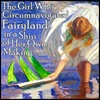 This must be a first of some kind.
This must be a first of some kind.
As the title of the LiveJournal entry where I found out about it notes, “a book that doesn’t actually exist yet won a major award.” Catherynne Valente, author of The Girl Who Circumnavigated Fairyland in a Ship of Her Own Making, won the Andre Norton Award for superior achievement in science fiction and fantasy writing for young adults at the 2009 Nebulas.
Why does it “not actually exist”? It was serially published to the web in return for donations on Valente’s website, and will not actually be published in print until May, 2011. So this book joins the ranks of such titles as John Scalzi’s Agent to the Stars, which was published on the web before it was accepted for print publication.
I have no doubt The Girl is a wonderful book, and will undoubtedly be helped by being able to feature its award-winning status on the cover of its very first printing. That Valente won a major award before the book even comes out “for real” is a major accomplishment, for which she is to be duly congratulated, and must surely be seen as another validation of the e-book as a format in general.
But it also represents a considerable annoyance, at least for me. After being posted on-line for a year, the last third of the e-book was removed from Valente’s website yesterday, before I even found out about the book, at the insistence of its future print publisher—Feiwel and Friends, an imprint of Macmillan.
As Valente says in her response to my annoyed comment about it in her LiveJournal post, she’s not happy about it either—but the publisher did not give her any choice in the matter, and she fought as hard as she could to keep even 2/3 of it up.
It is tempting, and would be altogether too easy, to say that she should have held out for a more permissive publisher—but not everybody has the star power of a Cory Doctorow. For an author in Valente’s position a contract with a major publisher would represent the reward for a considerable amount of hard work—not just monetarily, but in terms of publicity and recognition, which she would be foolish to forego if the other terms were even marginally favorable.
It is a pity that Feiwel and Friends will not give Valente the same leeway that fellow Macmillan imprint Tor gives Cory Doctorow. They seem to be concerned that having the complete e-book freely available would have an adverse effect on the demand for the printed version. That hasn’t been the case for Cory Doctorow’s work, but then, even Cory Doctorow seems to be something of a special case where Tor is concerned—there do not seem to be many other authors who get the same free e-book permission that he does.
I feel that the removal was a mistake, and will result in a lot of frustrated readers and would-be readers (not least of all me). Who is going to want to read only the first two thirds of a book that will not be published in full for another year? I have a hard enough time waiting for Baen Webscriptions to be published over the course of a couple of months. I know it does not make me favorably inclined toward buying the book even when it does come out.
Update: Corrected to no longer imply that The Girl was Valente’s first book, and to remove an incorrect mention of Tor.

































It is worth pointing out, because that isn’t obvious from what you’ve written, that this is not Catherynne Valente’s first published book. She has in fact (as far as I found with a quick check) at least 8 books in print and currently available on Amazon, going back to at least 2005. At least 3 of which are published by a “major publisher” (Spectra -> Bantam Books -> Random House), one of which (according to her website) is “Amazon’s #1 SFF Book of 2009” and the other two have won a number of awards already (2006 Tiptree Award winner, 2008 Mythopoeic Award Winner, 2007 World Fantasy Award nominee).
As such, while it is certainly an achievement to win a major award for a novel which has not yet been published in print, it is not as if Catherynne Valente is a total unknown who has suddenly and unexpectedly arrived on the scene.
She was unknown to me (though now that I think about it, I think I saw her LJ handle commenting on one of my LJ friends’ posts). But I’ve gone ahead and corrected the article.
It’s also worth noting that in addition to having won the Norton Award, Cat’s novel Palimpsest is currently nominated for the Hugo.
Also Feiwel is part of Macmillan, not “Tor Macmillan”; Tor is also a subsidiary of Macmillan. It’s almost certainly incorrect to suggest that there is any sort of relationship between the two houses, i.e., the behavior of Tor in no away affects the behavior of Feiwel. Beyond this Feiwel and Tor largely address separate market segments (the former is a general YA house, the latter a SF/F house), and one can argue that different market segments have different sales dynamics — what works at Tor may not work for Feiwel and vice versa.
As regards Tor, Tor has allowed other of its authors to publish materials online at no cost while keeping their books in print form — Peter Watts’ “Hindsight” is a fine example of this, and of course my own “Agent to the Stars” is available on my Web site (albeit in an earlier, un-copy-edited form).
Beyond this, when Tor.com debuted a couple of years ago, Tor marked the arrival of the site by releasing a dozen current books as free, DRM-less eBooks (including my own Old Man’s War), so I’m not entirely sure one can accurately say that Tor is worried about the adverse effects of the free eBook format.
While it does appear that you fully intend to punish the author for the actions of the publisher, it does not necessarily follow that the removal of some or all of a work online will end up being a material disadvantage to the author when the book comes out in printed form. I serialized Old Man’s War on my site and when I agreed to let Tor publish it, I pulled it off my Web site (also note it was my decision to do so, not Tor’s). My decision to pull the electronic text does not appear to have any more detriment to the sales of the book than Tor’s later decision to release a free DRM-free ebook copy.
I was under the impression that Tor Macmillan was the publisher’s full name—Tor Macmillan, a combination of Tor and Macmillan. I see I was in error. Fixed it.
As for the other, I thought I was making it clear that I placed the blame on the publisher rather than the author. As for my decision whether or not to buy the book when it comes out being influenced by this, well, it is. I’m annoyed at the publisher for doing this, so I may not buy that book from that publisher.
I’m not sure how you get that my not buying the book would be “punishing the author”, given that significantly more money from the sale of the book goes to the publisher, who are the ones that actually made the decision I disliked. I’m punishing the publisher.
If the author ever makes the book available in full on her site again, and is still taking donations, I might kick in some money to her then.
Chris Meadows:
“I’m not sure how you get that my not buying the book would be ‘punishing the author'”
Because provided that you were considering purchasing the book at all, your choice not to purchase the book to “punish the publisher” materially hurts the author more. The publisher has an entire slate of books, and thus numerous opportunities to generate income across the entire line, and always has more books on the way. The author, on the other hand, is dependent on her own sales record, and can write but one book at time. The publisher isn’t going to register your annoyance and possible choice not to purchase the work as commentary on its publishing practices; what it’s going to do is look at the author’s sales and decide whether to work with that author again.
Moreover, the argument that the publisher makes more money than the author is a bit of a red herring. Leaving aside the publishers’ sunk costs in production, distribution and publicity (costs which the author does not then have to bear), from the author point of view the question is whether he or she can make more money from their work being published than on their own steam. The answer to this is still generally yes; successful publication here not only exposes writers to more readers but also confers legitimacy that helps with things like foreign sales — a lot of foreign publishers simply won’t buy a book (and particularly genre books) if it’s not been professionally published in the US first, and garnered sufficient sales/reviews. US publishers have nothing to gain from these foreign sales, but authors definitely do. So again, the question is who you are really punishing, as opposed to who you think you are punishing.
Cat has more than enough of the story on her site for you or any other reader to know if the story is something you would want to read all the way through. Cat also, like nearly every other writer, has to make a living, which sometimes means working with the technologically clueless (or more charitably, with those who have different opinions about the value of the formats you value). The path to getting it so that Cat or any other writer can make their work available online on their own terms is not to “punish the publisher,” it’s to support the author, so that the next time she goes to contract, she has the clout and wherewithal to say “This gets done the way I want it done, or I go to a publisher who will let me do it,” and it’s a viable threat. Buying the book does not directly validate the publisher’s strategy, it increases the clout of the author. Because again, at the end of the day, what the publisher is going to look at are the sales numbers for that author.
I suppose Catherynne has checked with her lawyers that saying “pay me and the on-line book will be free for everyone” is not legally binding, since she got paid for making a ebook and has now reneged on that agreement. Is she going to return the donations?
I did not donate, but if a had I would certainly sue.
I didn’t donate either, so I only want to know if Feiwel/MacMillan has plans to publish an ebook edition. If not, I don’t think they should have forced her to remove the ebook from her website.
@Bruce, yes there’s supposed to be an ebook edition released at the same time as the pbook.